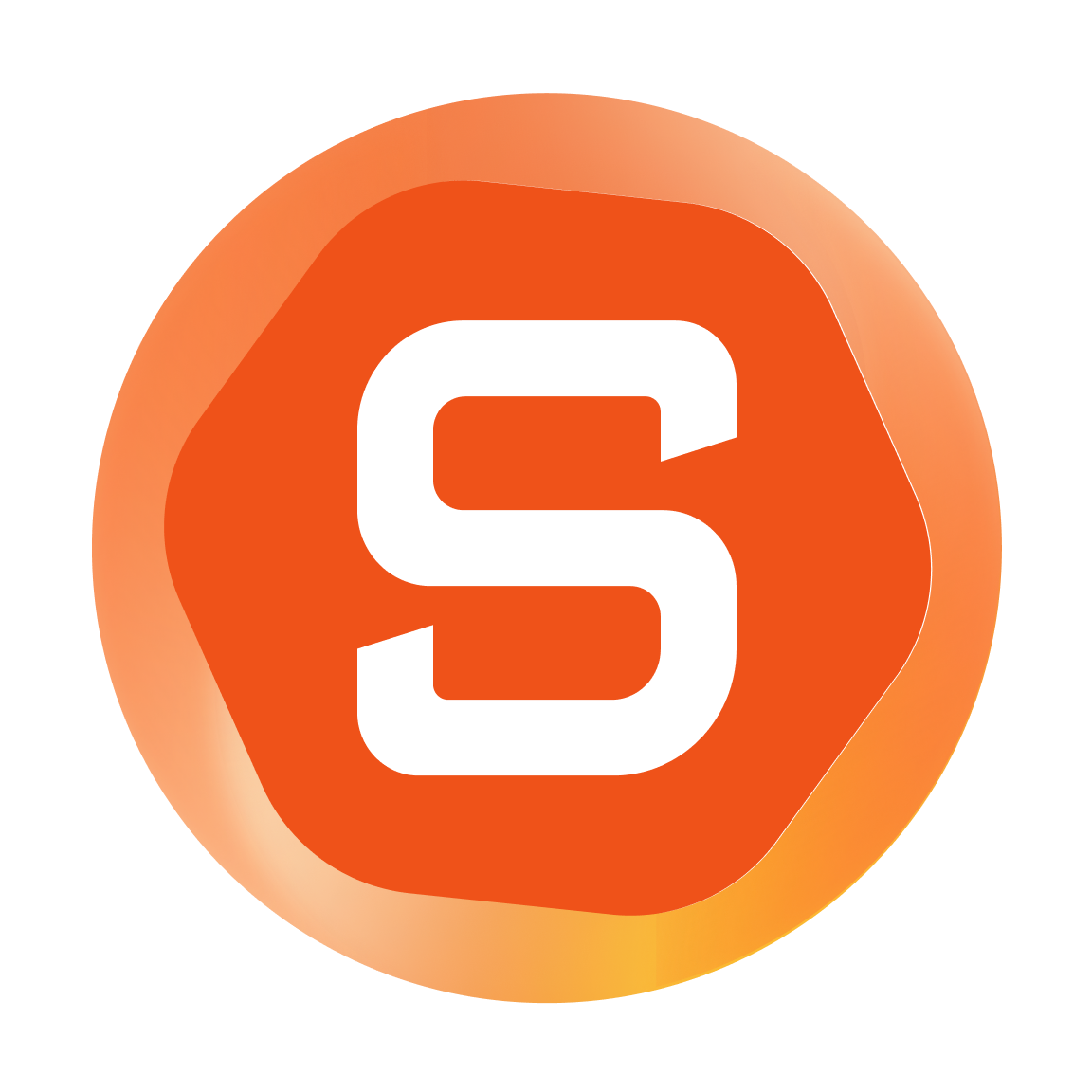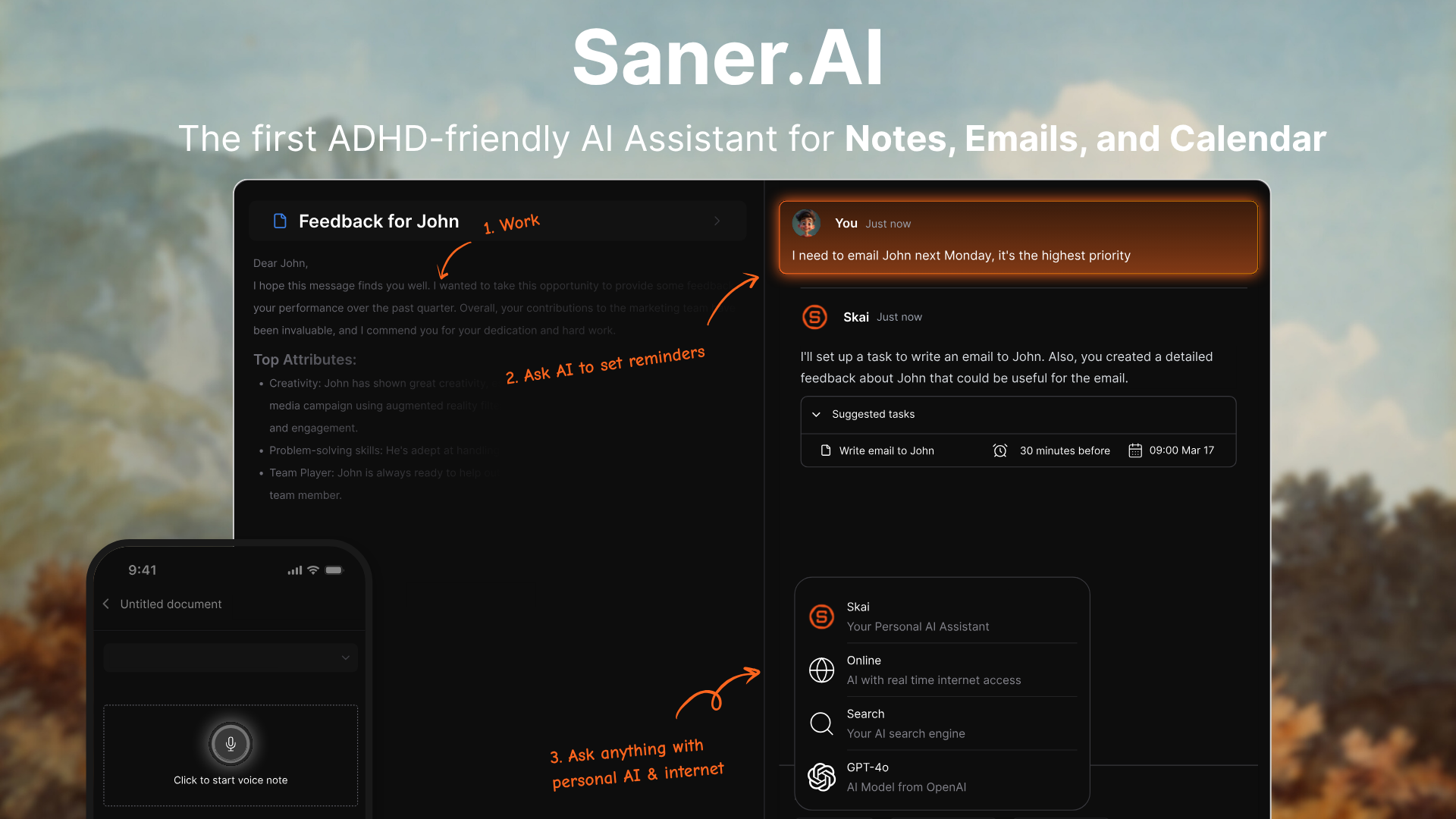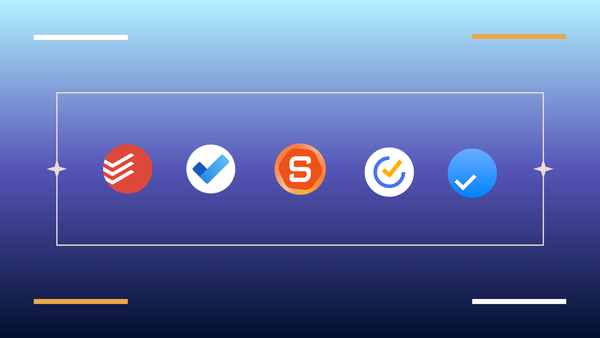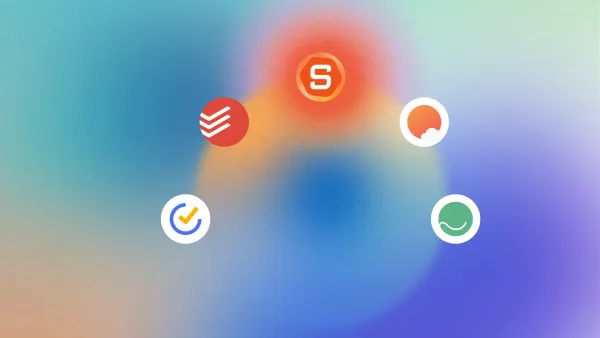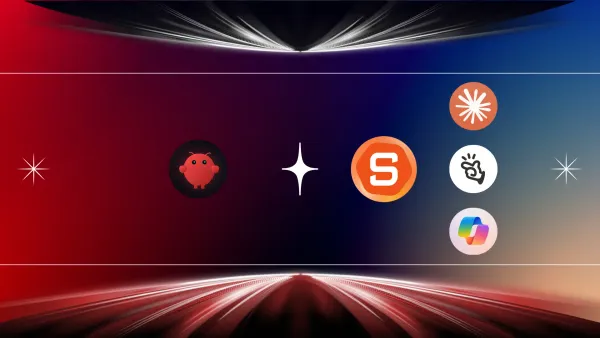Sunsama Alternatives: We tested the Best 8 in 2025
The best Sunsama Alternatives in 2025 are: Saner.AI, Reclaim, Todoist, Motion, Akiflow, Flowsavvy, and SkedPal
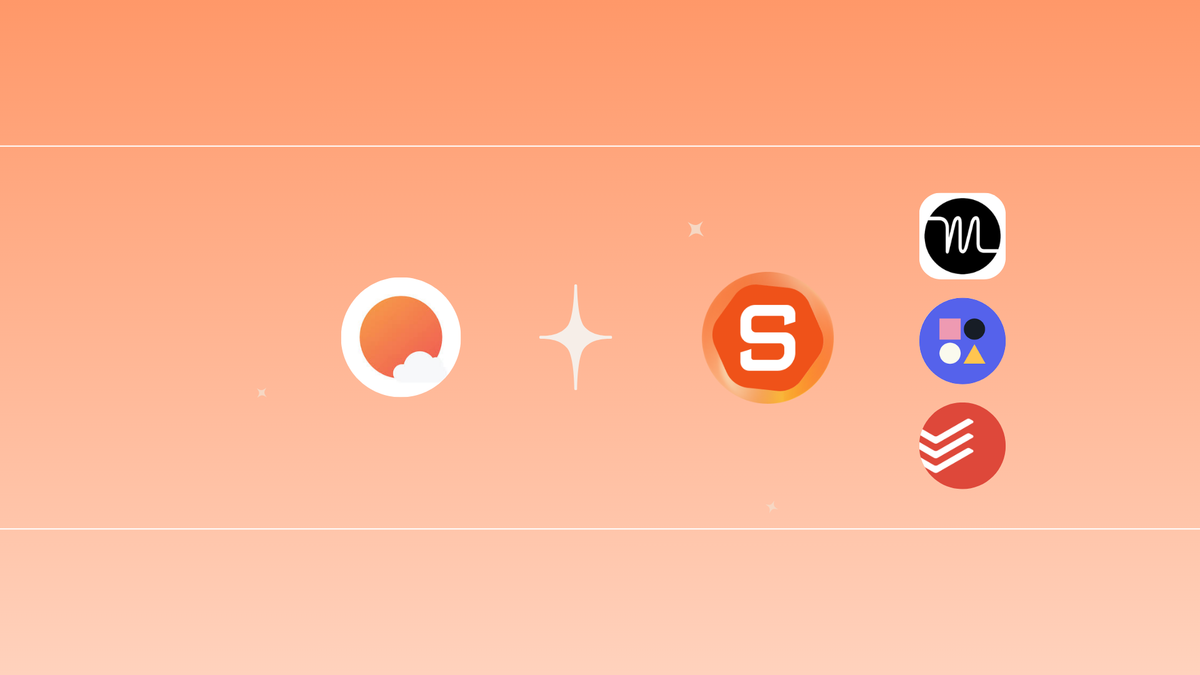
8 Best Sunsama Alternatives in 2025
Sunsama is a planning tool for good reason - but it’s not for everyone.
Maybe:
- You want something less expensive (or free).
- You need a tool that works better with how your brain plans things - especially if you have ADHD.
- Or you’re just tired of forcing your tasks into a rigid daily schedule.
This guide has you covered.
We’ve researched and tested the best Sunsama alternatives - tools that combine task management, calendar planning, and focused productivity, without the fluff or high price tag.
Let’s find the right one for you!
What Makes a Great Sunsama Alternative?
Before we dive in, let’s clarify what people love about Sunsama - and where it sometimes falls short.
Sunsama strengths:
- Thoughtful daily planning flow
- Task + calendar integration
- Designed to encourage calm productivity
- Great for solo users who want more intentional workdays
But people often switch because:
- It’s expensive ($20/month)
- It can feel slow or bloated
- It’s not ideal for teams or ADHD brains that don’t think linearly
- Lacks powerful automation or AI features
So when evaluating Sunsama alternatives, here’s what we looked for:
- ✅ Task + calendar integration
- 🧠 ADHD-friendly workflows (brain dumps, flexible planning)
- ⚡ Ease of use (fast UI, low friction)
- 💰 Affordable or free plans
- 🤝 Good for teams or solo use
- 🤖 Smart features like AI planning or automation
What Are The Best Sunsama Alternatives?
The best Sunsama Alternatives in 2025 are: Saner.AI, Reclaim, Todoist, and Motion
🧠 Updated Sunsama Alternatives Comparison Table (2025)
| Tool | Calendar Integration | AI / Auto-Scheduling Features | Best For | Free Plan? | Paid Plan |
|---|---|---|---|---|---|
| Saner.AI | Yes (Gmail, Google Cal, Slack) | AI for notes, emails, todos, calendar, daily planning | ADHD brains, entrepreneurs, knowledge workers | ✅ | From $8/month |
| Motion | Yes (Built-in) | Full AI scheduling, moves tasks as needed | Busy professionals, teams | ❌ (trial) | $29/month |
| Akiflow | Yes (Google Cal, Outlook) | Manual time-blocking, fast input | Power users, shortcut lovers | ❌ (trial) | $34/month |
| Todoist | Yes (via sync) | Natural language, priority tagging | Task lovers, students, freelancers | ✅ | From $4/month |
| Reclaim | Yes (Google, Outlook) | Smart time blocking, auto habits | Teams, calendar-heavy schedules | ✅ | From $8/month |
| FlowSavvy | Yes (Google, iCloud, Outlook) | Auto-schedules tasks, load balancing | Lightweight automation, solo users | ✅ | From $5/month (annual) |
| SkedPal | Yes (Google, iCloud, Office 365) | Priority windows, adaptive AI rescheduling | Structured planners, consultants | ❌ (trial) | From $9.95/month |
| Notion | Yes (manual/templated) | Custom dashboards, Notion AI (optional) | DIY dashboards, teams, knowledge base | ✅ | From $10/month |
1. Saner.AI
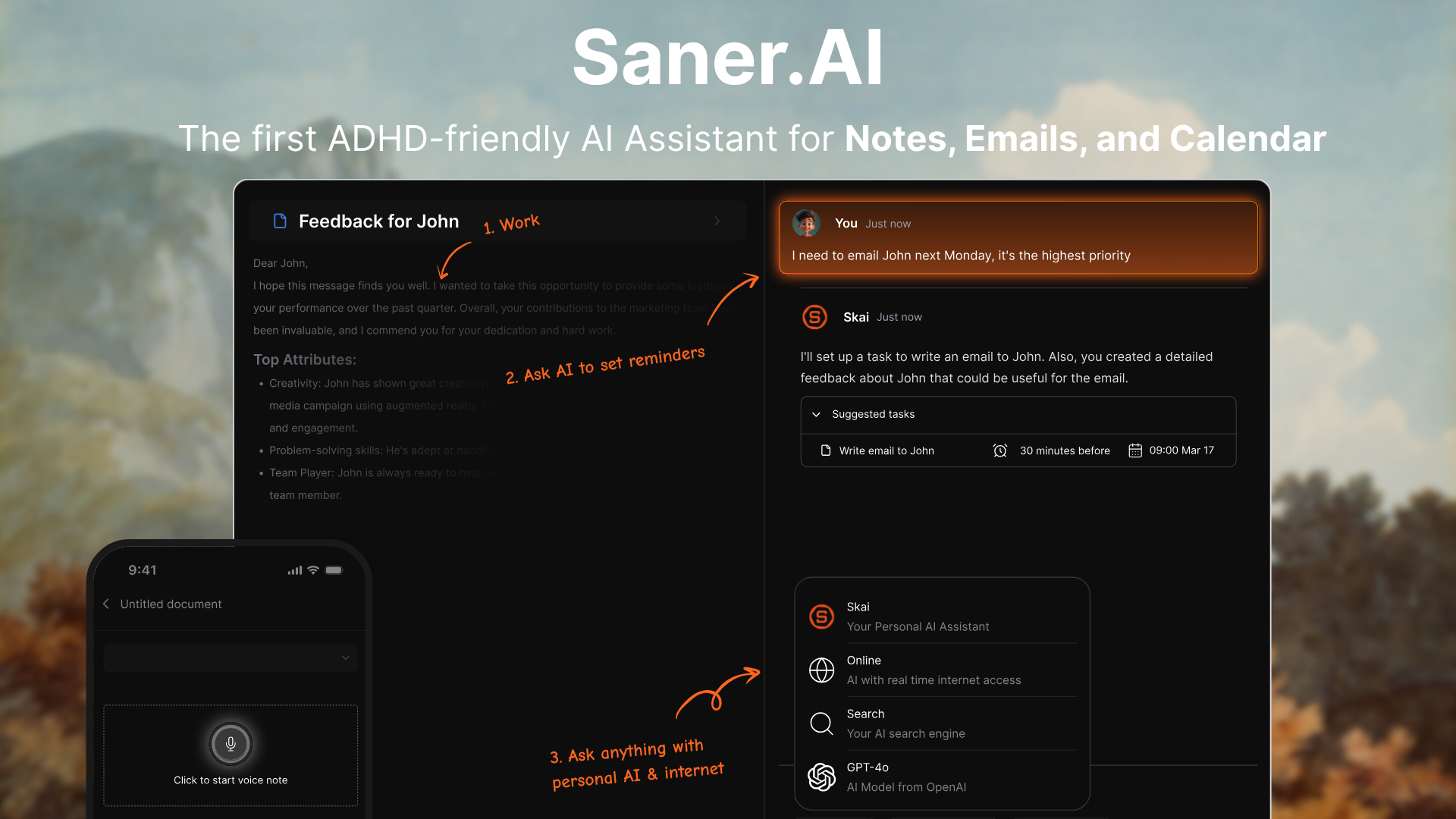
Saner.AI is a daily planning assistant that brings your notes, tasks, emails, and calendar together in one simple, ADHD-friendly workspace. Saner.AI shines when your work and brain feel chaotic. It's ideal for people who want to quickly offload messy thoughts, turn them into tasks, and get back to doing - not just planning.
It’s the best Sunsama alternative if you want AI support for organizing scattered thoughts, managing tasks with less friction, and reducing the overwhelm of juggling tools.
Key features
- Daily Planning: Every morning, AI prepares an optimal day schedule for you from emails, notes, tasks, and the calendar
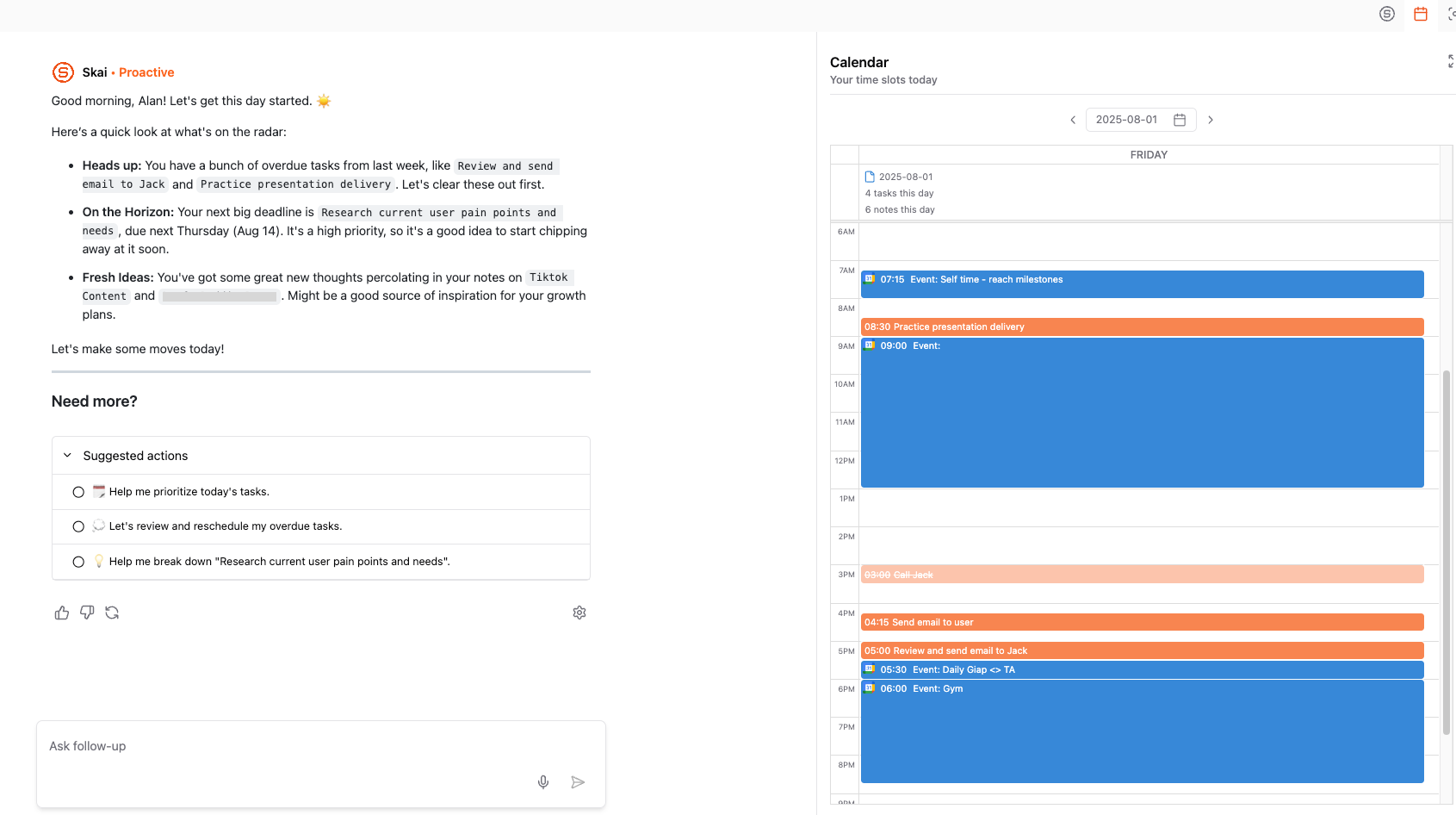
- Natural language search: Recall anything you've written, emailed, or scheduled without strict organization
- Built-in AI assistant (Skai): Summarizes meetings, plans your day, finds information, and answers questions about your data
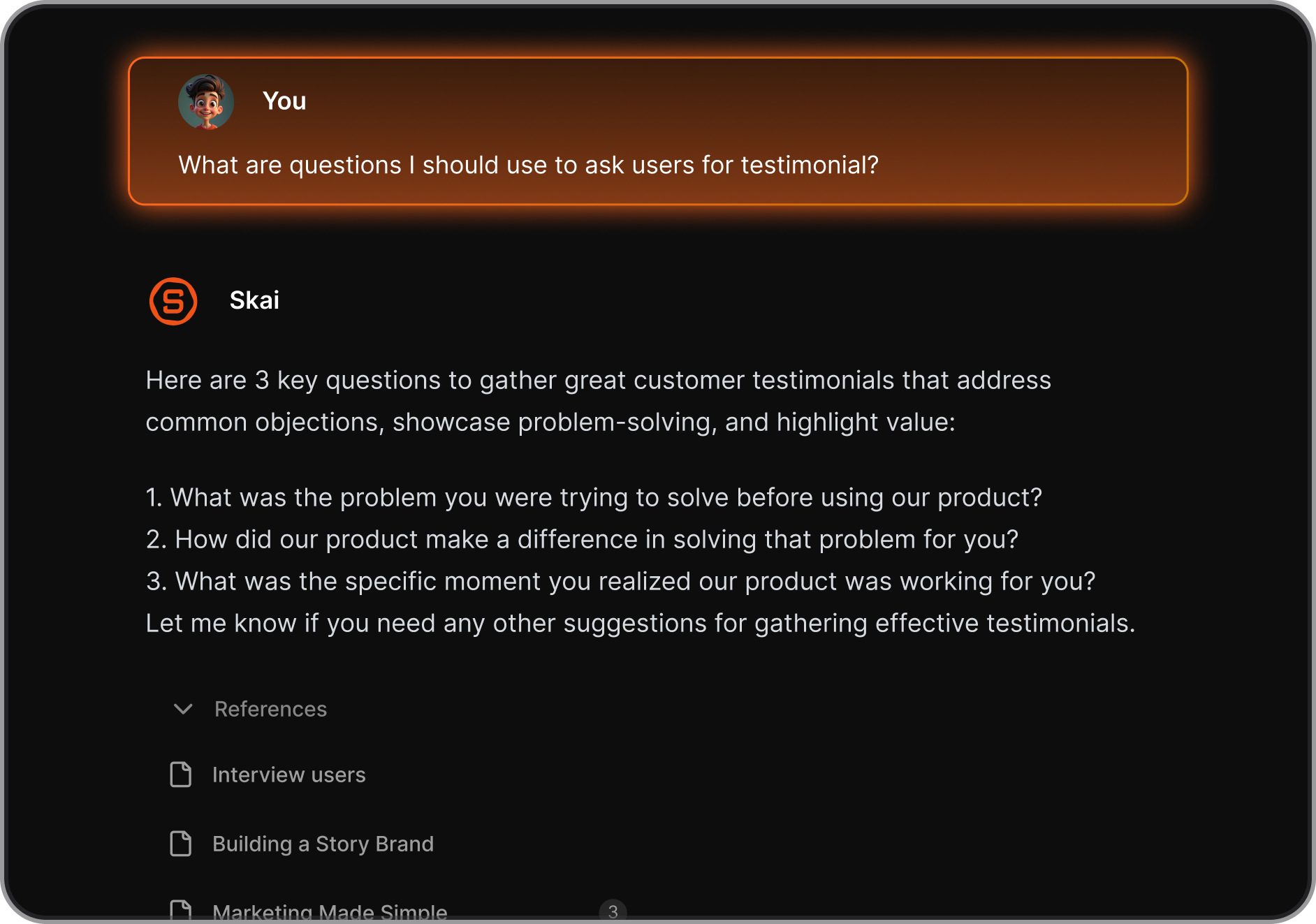
- Smart task capture: Turn messy brain dumps, rants, or emails into structured to-dos
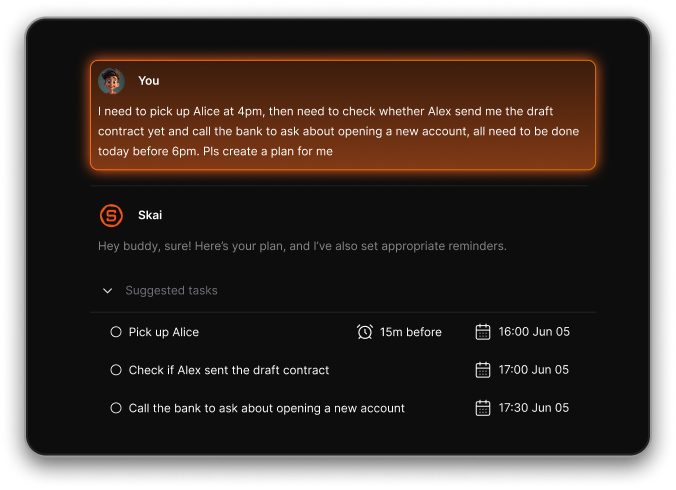
- ADHD-friendly design: Clean UI, minimal distractions, no strict tagging required
- Cross-platform: Works on web, iOS, Android, and has a Chrome extension
- Integrations: Connects to Gmail, Google Calendar, Google Drive, and Slack
What I liked
- You don’t need to organize everything - just type out a messy thought or drop in a note, and Skai helps you find or structure it later
- Great for people with executive dysfunction or ADHD - less effort to maintain, more support to take action
- Natural language search is powerful
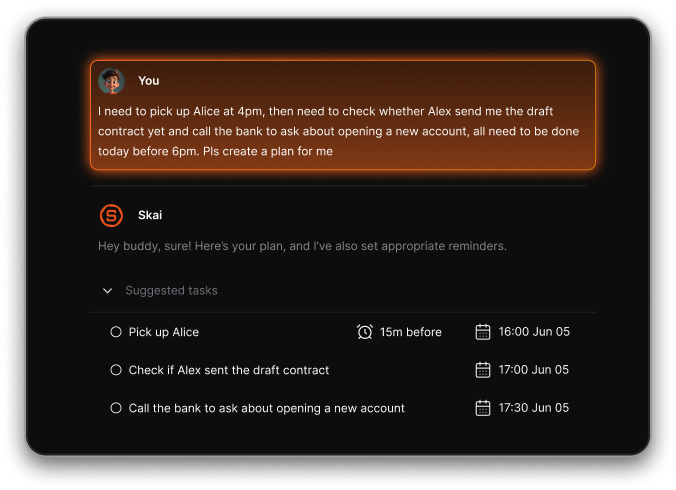
Cons
- Not ideal for large teams or project timelines — no Gantt charts or complex task dependencies.
Pricing
- Free
- Starter: Monthly at $8/month, Annually at $6/month (with early user discount)
- Standard: Monthly at $16/month, Annually at $12/month (with early user discount)
Who is it suitable for?
- Entrepreneurs, freelancers, and knowledge workers who want to think less about organizing and more about doing
- People with ADHD or busy minds who feel overwhelmed juggling multiple tools
- Users who prefer AI-assisted planning rather than rigid daily check-ins
- Anyone looking for a lighter, faster, and more flexible alternative to Sunsama
Saner.AI review

How to start using it?
- Head to saner.ai and create a free account
- Connect your calendar and email to bring in tasks and context
- Brain dump your thoughts, tasks, or notes - Skai will help structure and surface them
Stay on top of your work and life
2. Todoist
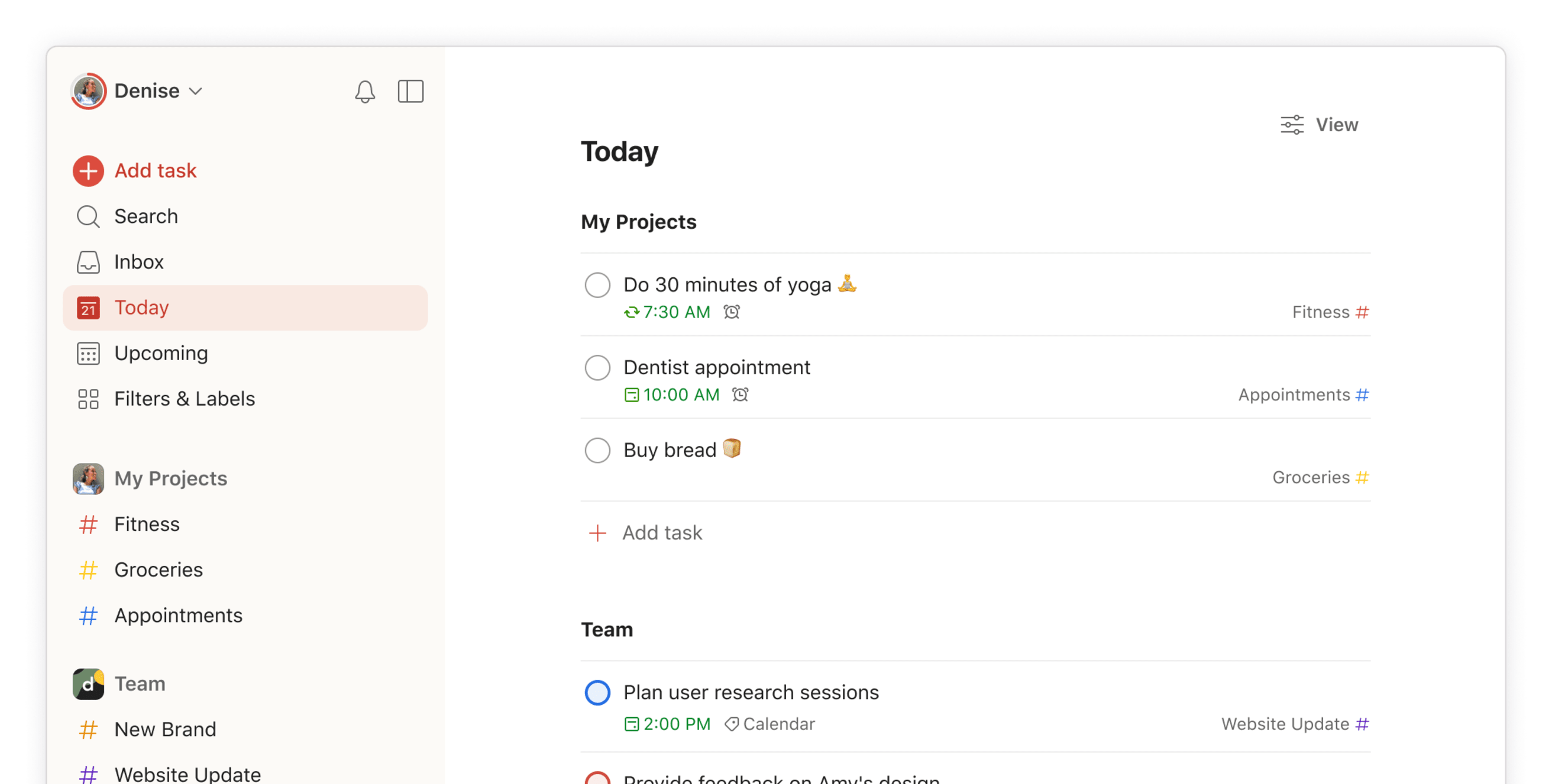
Todoist is a flexible, cross-platform task manager designed to help you organize everything from simple personal tasks to complex projects. It doesn’t take the calendar-first approach that Sunsama does, but it excels at giving you structure without overwhelming you.
Key features
- Cross-platform support: Works on web, desktop, mobile, and browser extensions
- Smart input: Add tasks using natural language like “Review report every Friday at 3pm”
- Labels, filters, and priorities: Organize tasks by context and urgency
- Project folders and sub-tasks: Break down work by goals or steps
What I liked
- The interface is clean, intuitive, and responsive across devices
- Everything syncs quickly between phone, laptop, and web
What I disliked
- No native time blocking or AI assistant - your tasks won’t automatically be placed on your calendar like in Saner.AI
- Some useful features, like reminders and calendar integration, are locked behind the paid plans
- Not ideal for complex project management with task dependencies or timelines
Pricing:
- Free
- Pr0: $5/month/user
- Business: $8/month/user
Suitable for:
- Individuals or small teams who want a customizable task manager without needing full daily planning, time-blocking, or complex project workflows.
Getting Started:
- Visit todoist.com, create a free account, and start by adding a few projects and tasks
Todoist reviews (source)

3. Skedpal

SkedPal is a smart calendar and task scheduler that automatically plans your day based on your priorities, time preferences, and availability. It blends your to-do list and calendar into one intelligent system that adjusts in real-time as your day changes.
Key features
- Smart Scheduling: Automatically plans your tasks based on deadlines, priorities, and availability
- Time Maps: Lets you define ideal times for different types of work, like deep focus in the morning or errands in the evening
- Auto-Rescheduling: Dynamically adjusts your schedule when new meetings pop up or tasks shift
What I liked
- It gives you super fine control, down to 5-minute task blocks
- I love how it balances work, personal stuff, and deep focus time

What I didn’t like
- The learning curve is real - setting up Time Maps and understanding task types can feel complex at first
- Mobile experience could be smoother; it works, but lacks some of the fluidity of a desktop
- No free forever plan — there’s only a 14-day trial, then you’ll need a paid subscription
- No chatbot-style interaction like Saner.AI
Pricing
- $14.95/month
- Or $9.95/month billed annually
- 14-day free trial
Suitable for
- People who want to focus on doing the work, not constantly reorganizing their to-do list. Especially useful for freelancers
Focuser
- Just head to skedpal.com, start your 14-day free trial
SkedPal Reviews (source)
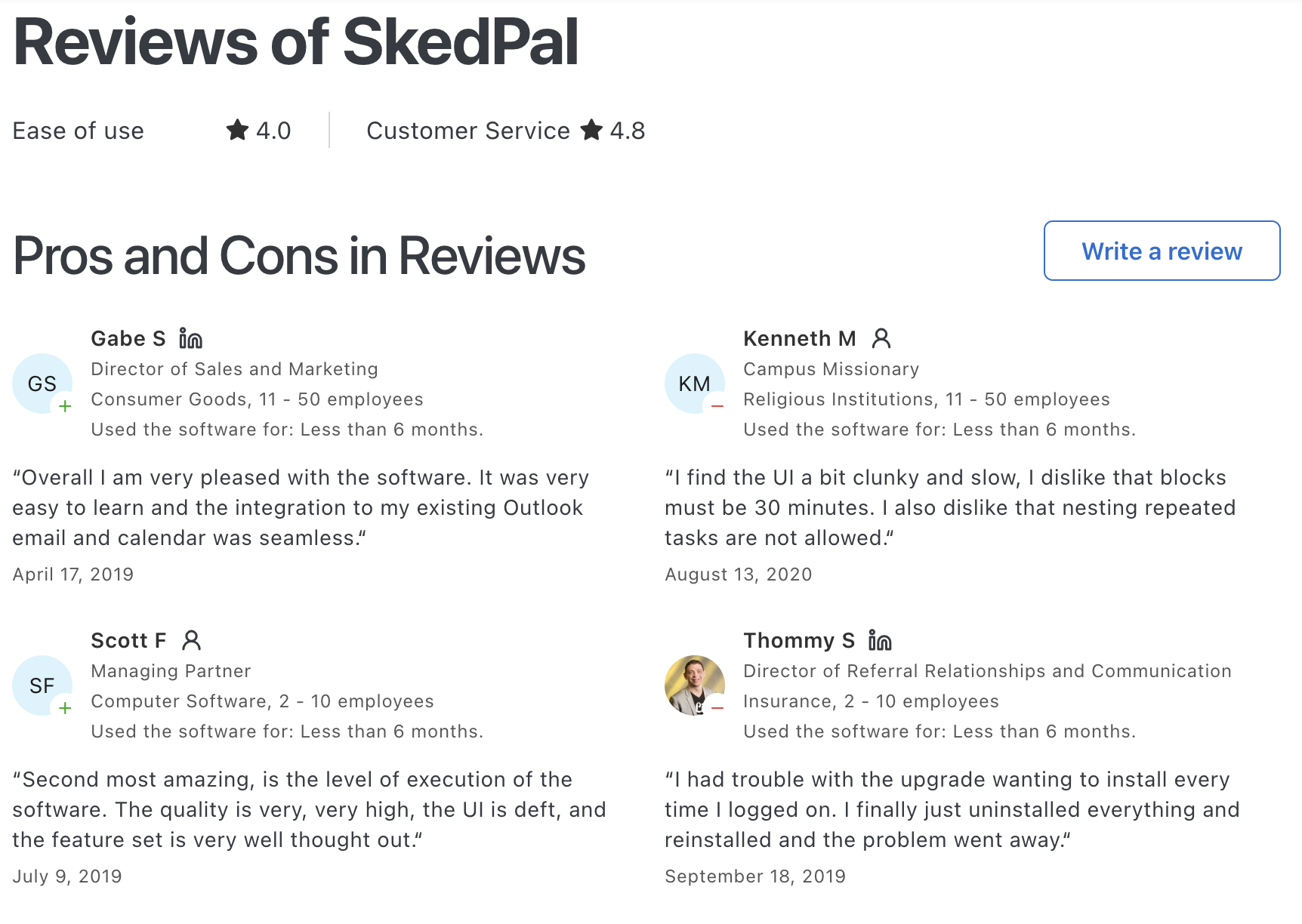
4. Reclaim

Reclaim.ai is an AI assistant that helps you take control of your time. It works behind the scenes to automatically block time on your calendar for tasks, deep work, habits, and breaks, without the need for constant manual tweaks.
Key features:
- Smart Time Blocking: Automatically protects time for focus work, tasks, and recurring habits
- Meeting Scheduling: Finds the best times for all attendees, adds buffer and travel time
- Habit Scheduling: Lets you create flexible daily/weekly habits like workouts or planning, then auto-schedules them
What I liked:
- The smart scheduling is effective - it finds time for deep work, so you don’t have to think about it
- I liked how I could set Focus Time goals and have Reclaim carve that time out automatically

What I didn’t love:
- There’s no strong mobile app experience yet, which feels like a drawback in 2025
- Outlook support is still in early stages, so it may not work as smoothly as Google Calendar
- It’s not a chatbot, so you can’t just say “schedule writing time tomorrow”—everything runs by rules
Pricing:
- Free Lite plan
- Starter plan around $10/user/month
- Business plan around $15/user/month
- Enterprise plans start around $18/user/month
Best for:
- Teams that use Google or Outlook calendars
How to start:
- Just head to reclaim.ai, create a free account, and connect your calendar
Reclaim reviews (source)

5. Akiflow

Akiflow is a centralized daily planning tool that pulls all your tasks, meetings, and reminders into one calendar-first interface. If Sunsama appeals because you want structure, routines, and calm in your schedule, then Akiflow might be a strong alternative.
Key features
- Task Consolidation & Universal Inbox: Imports tasks from 3000+ tools like Slack, Gmail, Notion, Asana into a central inbox
- Drag-and-Drop Time Blocking: Lets you easily schedule tasks directly into your calendar
- Focus Mode & Focus Timer: Helps you stay on one task at a time without distractions
What I liked
- Syncs well with tools you already use, so you don’t have to overhaul your entire workflow
What I disliked
- No permanent free plan, so you’ll have to pay to keep using it beyond the trial
- Mobile app is newer and still lacks some desktop features
- Not built for complex project management - great for day-to-day task execution, but not timelines or team workflows
Pricing
- No free tier
- Paid plans start at $34/month (billed monthly)
Suitable for
Professionals, remote workers, and freelancers who want a single place to manage their schedule, to-dos, and planning rituals. Great for people juggling lots of tools and seeking structure in their day.
How to start
Head to Akiflow, start the free trial, connect your calendars and task apps, set up your planning rituals, and try scheduling your next few days to see how it fits your workflow.
Akiflow Reviews (source)

6. Flowsavvy

FlowSavvy is an intelligent auto-scheduling and time-blocking tool designed to simplify how you plan your day, week, and recurring habits.
Key features
- Auto-scheduling and dynamic rescheduling: Enter your tasks and deadlines, and FlowSavvy schedules them around your calendar. It automatically updates when plans shift.
- Recurring tasks and habits: Supports daily/weekly routines that get scheduled automatically.
- Smart scheduling hours: Lets you define when to schedule work vs personal tasks.
What I liked
- Auto-scheduling is okay: you can throw in tasks, and FlowSavvy fits them around your day without manual drag-and-drop.
- The mobile app makes it easy to keep your schedule updated on the go.
What I disliked
- It takes time to set up - defining hours, priorities, and recurring tasks isn't instant.
- Sometimes when tasks are split around events, manual adjustments are tricky and can feel unintuitive.
- The design is clean but basic - some users might want more personalization or theme options.
Pricing
- Free plan: $0/month
- Pro plan: $7/month
Suitable for
- Solo professionals, students, and freelancers who want to automate their planning and reduce daily decision fatigue.
How to start
- Sign up for free at flowsavvy.app.
- Connect your calendars (Google, iCloud, or Outlook).
Flowsavvy reviews (source)
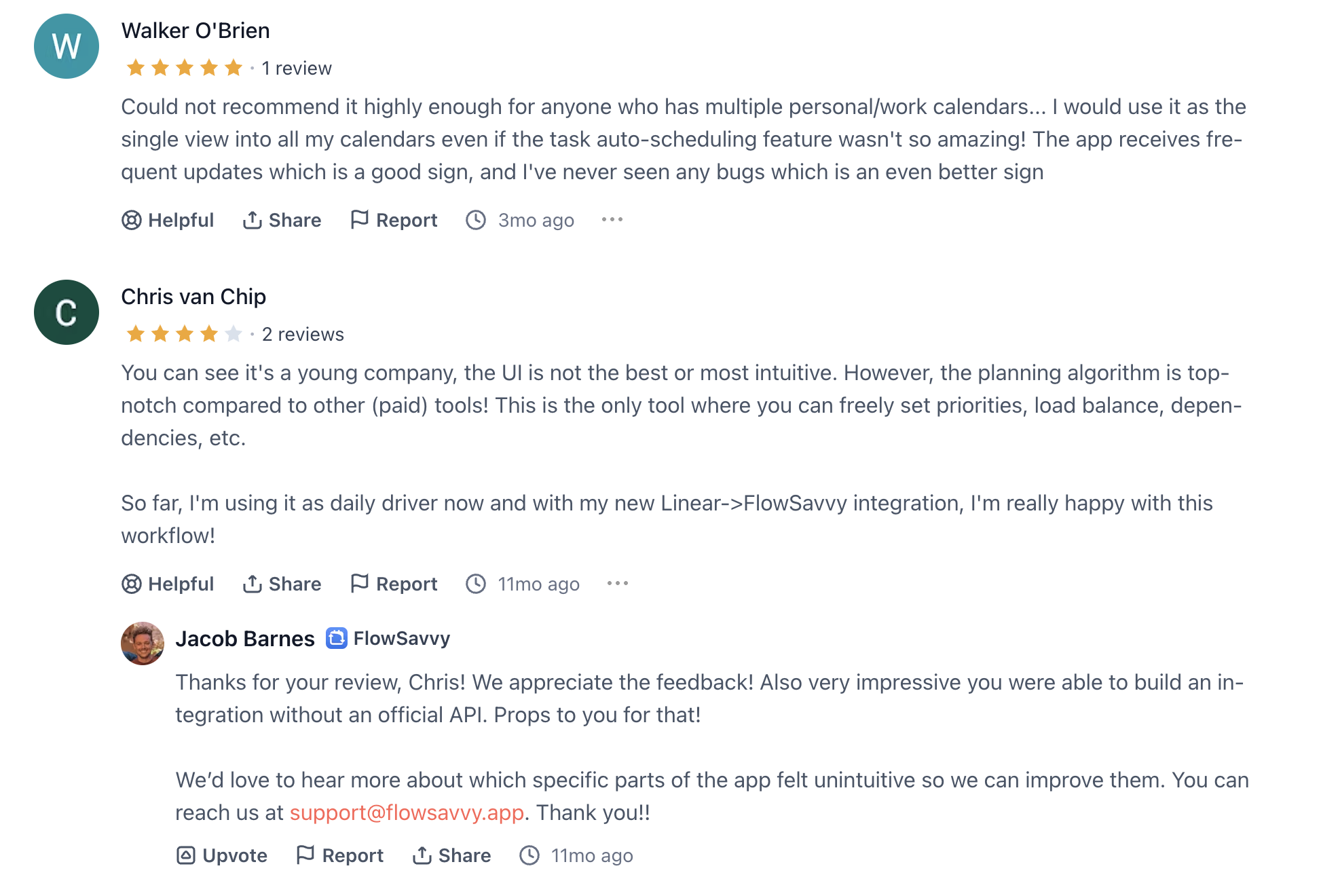
7. Notion

Notion is an all-in-one workspace that blends notes, tasks, calendars. It doesn’t auto-schedule your day like Sunsama, but its strength is giving you full control to build your own system.
Key features
- Databases with multiple views: table, kanban, calendar, list
- Custom time-blocking templates and daily planners
- Notion Calendar: native calendar tool for scheduling events, tasks, and routines
- AI assistant: summarization, content generation, autofill, connected properties
What I liked
- You can structure everything exactly the way you want — projects, notes, and tasks live together in one place
- The calendar view makes it easy to schedule blocks and see everything in context
- Offline mode is great for staying productive without the internet

What I disliked
- You’ll need to spend time setting up templates, views, and workflows
- Some AI and advanced features require the Business plan
- No smart time blocking or auto-prioritization for tasks like Saner.AI
Pricing
- Free plan for personal use
- Plus plan starts at $10/user/month
- Business plan with full AI features is $20/user/month
Suitable for
- Professionals and teams who want full control over their planning system
- Users who enjoy customizing their workspace
- People who don’t mind setting things up manually
How to start
Just go to Notion, create a free account, and explore templates or build your own workflow from scratch.
Notion reviews (source)

8. Motion

Motion is an AI productivity suite that helps you automatically plan your day by intelligently scheduling tasks, meetings, and projects around your calendar. Instead of manually juggling to-dos and shifting priorities, Motion’s algorithms take care of it for you - adapting in real time as your day changes.
Key features
- AI task scheduling: Automatically slots tasks into your calendar based on priority, deadlines, and availability
- Smart calendar: Integrates meetings, events, and tasks into one cohesive view
- Project management: Supports task dependencies, stages, and collaborative workflows
- AI agents: Experimental “AI Employees” that help write documents, manage SOPs, or assist with routine tasks
What I liked
- Tasks automatically rearrange when new meetings are added,
- The project features go beyond basic to-do lists - you can map out timelines, assign collaborators, and track progress at a higher level
What I disliked
- It’s expensive. The starting price is much higher than typical task managers or daily planners
- There’s a learning curve. Getting the most out of Motion requires setup, adjusting preferences, and learning its automation logic
- Sometimes the auto-scheduling can feel too rigid or unexpected if you like more manual control over your day
- The company shifts to an enterprise focus, leading to complicated features
Pricing
- Starts at $49/user/month for the individual Pro AI plan
- Business plans at $69/user/month with team features
- Custom pricing available for Enterprise
Suitable for
- Teams that want to automate their planning.
How to start
- Sign up for a free trial at Motion, connect your calendar, and import your tasks or projects
Choosing the Right Sunsama Alternatives 💡
Sunsama is a good tool for intentional planning - but it's not one-size-fits-all.
Maybe you're looking for:
- Something more affordable
- A faster, simpler interface
- Smarter AI that fits your workflow
- Or a system that works with how your brain actually operates—especially if you're neurodivergent
The good news? You have options.
From AI-first assistants like Saner.AI and Motion, to auto-schedulers like Reclaim, FlowSavvy, and SkedPal - there’s a Sunsama alternative that’s probably a better fit for your work style, team size, and brain type.
What to do next:
👉 Try 1–2 tools from this list.
👉 Start with your real tasks - not test data.
👉 See how it feels over a few days.
You don’t need the perfect productivity toolinternet.
You just need one that helps you show up, stay on track, and go home with a clear mind.
Stay on top of your work and life with the top Sunsama Alternative
FAQ: Best Sunsama Alternatives (Guide)
1. Why do people look for Sunsama alternatives?
Sunsama is a popular daily planner that combines tasks, calendar, and focus planning. But it’s not for everyone.
People often look for Sunsama alternatives because of:
- Price – At $20/month, it can feel expensive for solo users
- Limited features – Lacks deep note-taking, AI, or email integration
- Complexity – Some find the setup too structured or rigid
- ADHD challenges – Daily planning can feel like a chore rather than a boost
If you’re looking for a tool that fits your unique workflow better - especially one that supports ADHD brains, automation, or more integrations - there are solid options out there.
2. What are the best Sunsama alternatives right now?
Top tools to consider include:
- Saner.AI – AI-powered planner that turns notes, emails, and thoughts into action
- Motion – Auto-scheduling based on calendar availability
- Reclaim – Smart time-blocking for work/life balance
- Akiflow – Fast keyboard-based task + calendar hub
- Notion – Flexible all-in-one workspace (requires setup)
- Todoist – Simple task manager with strong cross-platform support
Each has different strengths depending on how you plan, think, and work.
3. Which Sunsama alternative is best for ADHD?
Saner.AI stands out for ADHD users:
- Lets you brain dump messy thoughts, and turns them into tasks
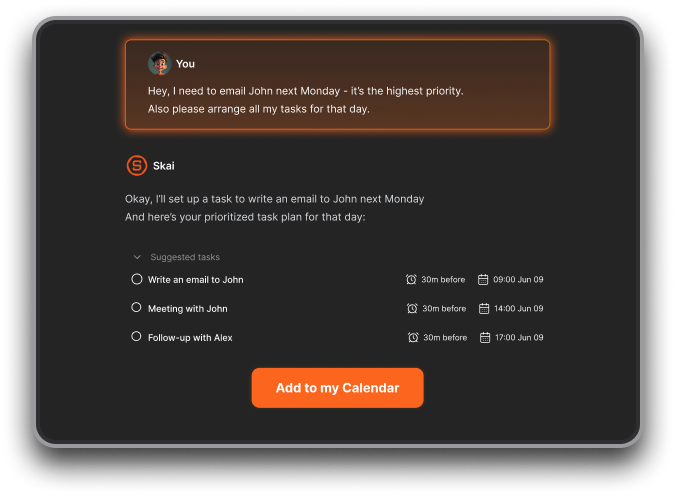
- Doesn’t require constant tagging or organizing
- Suggests a daily plan based on what’s already in your notes, emails, and calendar
- Works like a calm, supportive assistant - great for avoiding overwhelm
4. What’s the most beginner-friendly alternative to Sunsama?
If you want something that just works, try:
- Saner.AI – Start typing or talking, and it handles the rest (notes, tasks, reminders)
- Todoist – Minimal, clean, easy to use on any device
Both are great if you don’t want to spend time configuring workflows.
5. Which Sunsama alternative auto-schedules tasks?
Three tools excel at automatic scheduling:
- Saner.AI – Uses AI to understand your workload and priorities, then suggests time blocks
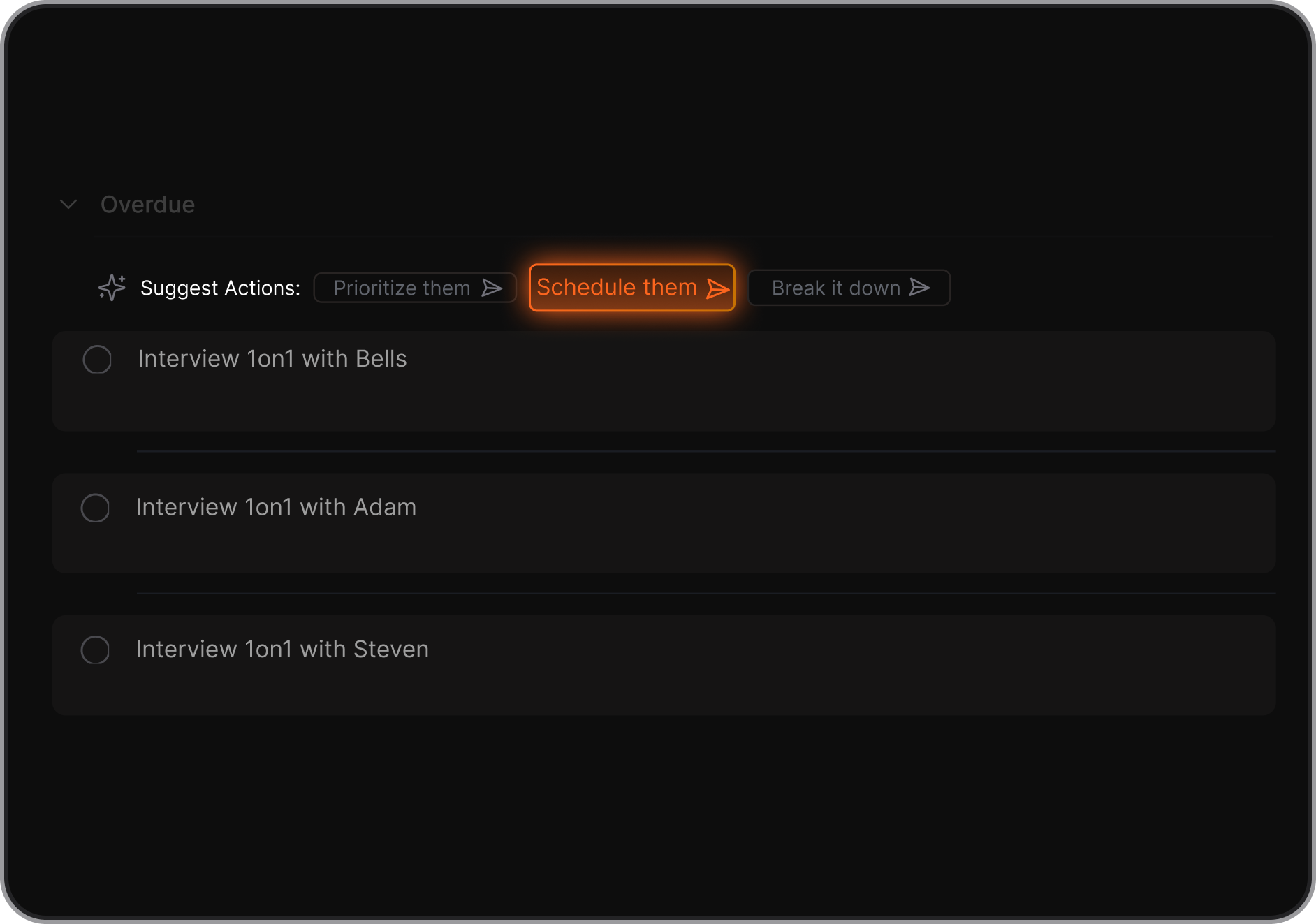
- Motion – Automatically adds tasks to your calendar based on deadlines
- Reclaim – Balances work tasks, meetings, and personal time with dynamic calendar blocking
If you want more context-aware suggestions (like from your notes or brain dumps), Saner.AI goes deeper.
6. I use Notion. Can it replace Sunsama?
Yes, but with effort. Notion is flexible - you can build a custom planner system. However:
- It lacks built-in task scheduling or smart reminders
- No AI-powered suggestions or auto-prioritization
- You may spend more time designing your system than actually using it
If you want more structure out of the box, consider Notion templates or pair it with something like Saner.AI.
7. Which tool replaces both Sunsama and my to-do list app?
Saner.AI and Motion are both strong contenders:
- Saner.AI: Combines calendar, notes, tasks, and daily planning into one assistant
- Motion: Focuses on calendar + to-do with auto-scheduling
If you also want AI to help you plan, write, or think, Saner.AI offers a more holistic solution.
8. Are there free alternatives to Sunsama?
Yes. Some tools offer free plans or trials:
- Saner.AI – Free plan includes task reminders, AI planning, and calendar sync
- Reclaim – Free tier includes basic smart time blocking
- Todoist – Robust free version for task management
- Notion – Always free for individuals
Check each tool’s pricing page for current limits.
9. Which Sunsama alternative is best for entrepreneurs?
Founders often need speed, clarity, and minimal friction. Top picks:
- Saner.AI – Brain-dump your ideas, and it turns them into organized plans
- Akiflow – Great if you love shortcuts and fast action
- Notion – Ideal if your business needs docs, wikis, and databases alongside planning
10. What’s the best Sunsama alternative for team collaboration?
- Reclaim – Smart scheduling that considers multiple calendars
- Notion – Best for shared docs, project planning, and knowledge bases
- Saner.AI (soon) – Designed for individual clarity, with team features in progress
If you're managing a team but want to avoid micromanaging, these tools help everyone stay aligned.
11. What if I just want to manage my personal life better?
- Todoist – Easy way to track groceries, chores, and personal goals
- Reclaim – Blocks time for habits like workouts, reading, or family time
- Saner.AI – Lets you dump thoughts like “book dentist” and automatically reminds you later
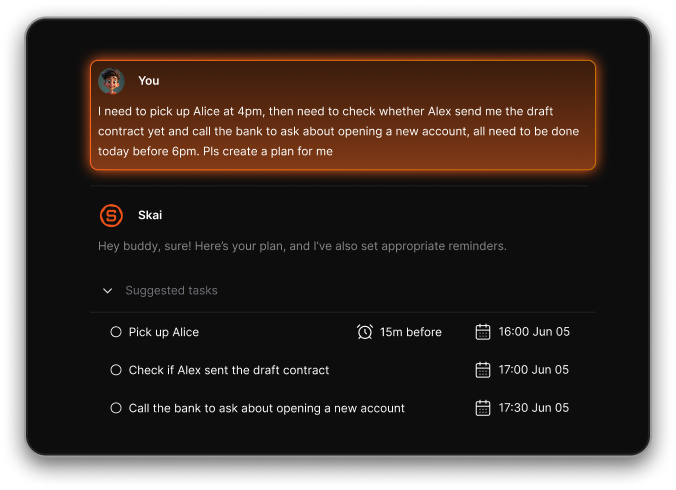
12. Is there a Sunsama alternative that handles email, calendar, and tasks?
Yes - Saner.AI brings it all together:
- Connects Gmail, Google Calendar, Google Drive
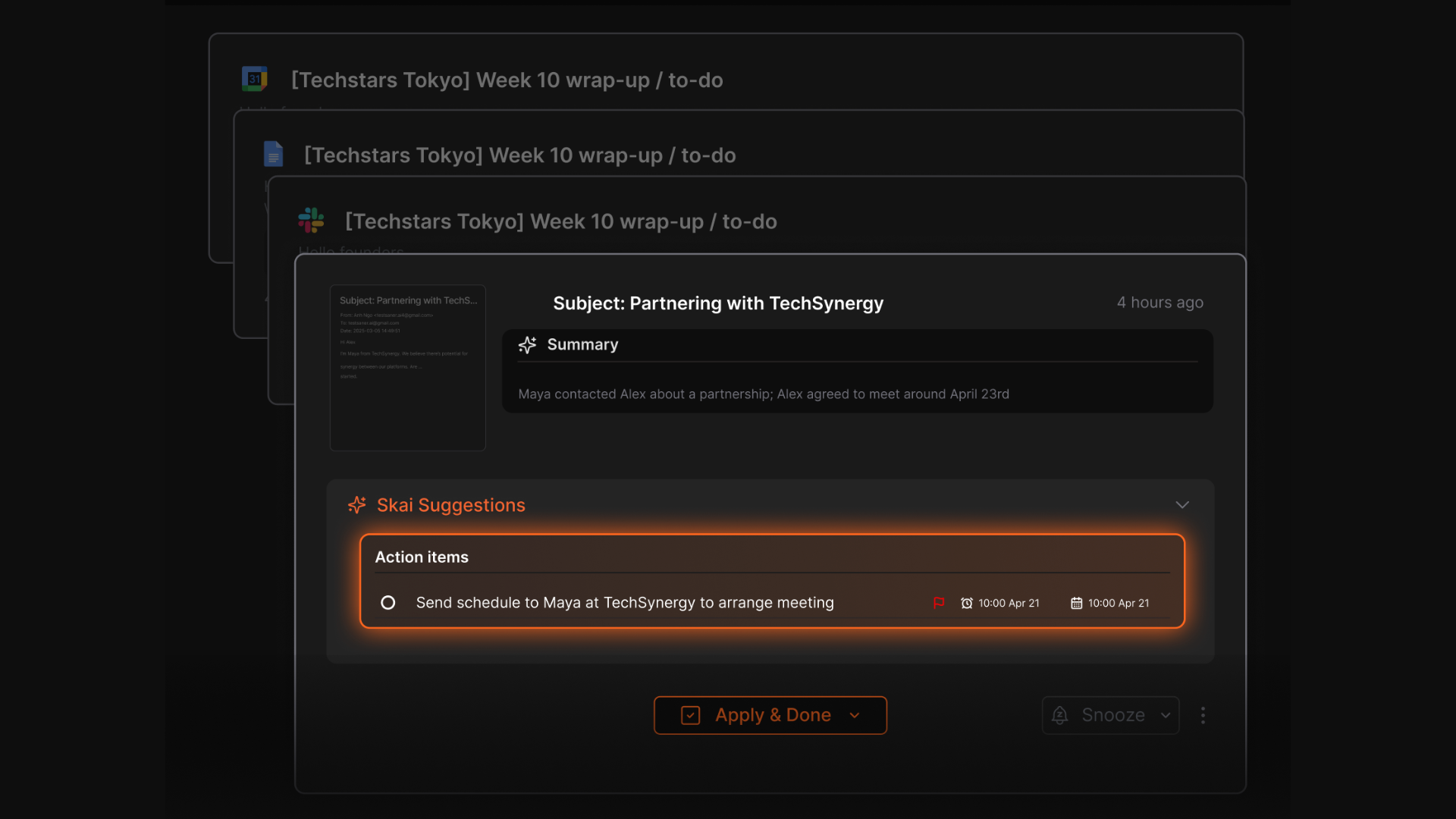
- Finds tasks hidden in notes or emails
- Suggests what to do next based on context
Great for people who live inside their inbox and want help without switching tabs all day.
13. Do these alternatives work on mobile?
Most of them do! Here's a quick rundown:
- Saner.AI – iOS and Android app (lightweight, fast)

- Motion – Full mobile apps
- Todoist – Great mobile UX
- Notion – Mobile-friendly but less fast for quick planning
14. Which Sunsama alternative works best with Google Calendar?
- Saner.AI – 2-way sync + task scheduling from notes
- Reclaim – Deep Google Calendar integration with smart scheduling
- Motion – Calendar-first planner with auto-inserts
All three are great choices depending on how you think—notes-first, habit-first, or calendar-first.
15. How do I pick the best Sunsama alternative for me?
Here’s a quick way to decide:
| Use Case | Best Fit |
|---|---|
| Want AI to plan my day? | Saner.AI |
| Want auto time blocking? | Reclaim or Motion |
| Prefer minimal task manager? | Todoist |
| Love building custom workflows? | Notion |
| Keyboard-driven workflow? | Akiflow |
| Need to combine email + notes + calendar? | Saner.AI |
Test one or two based on what overwhelms you the most: planning, remembering, or context switching
Tired of Sunsama?
